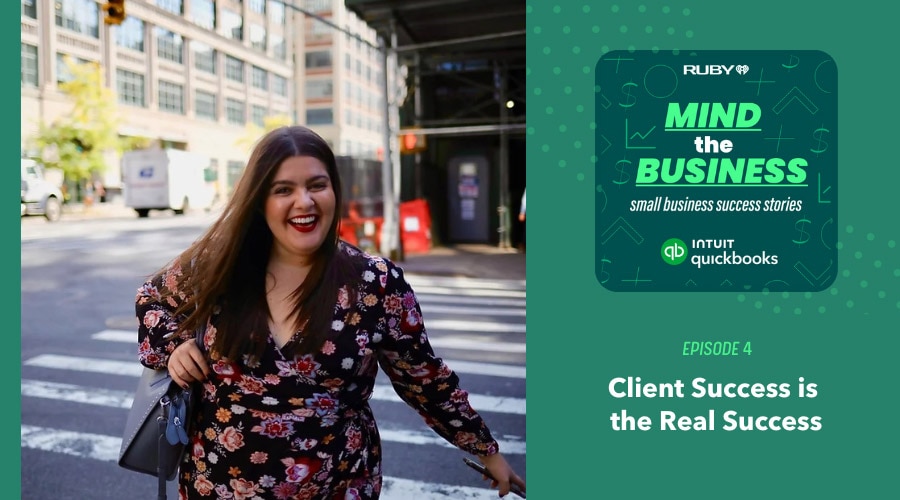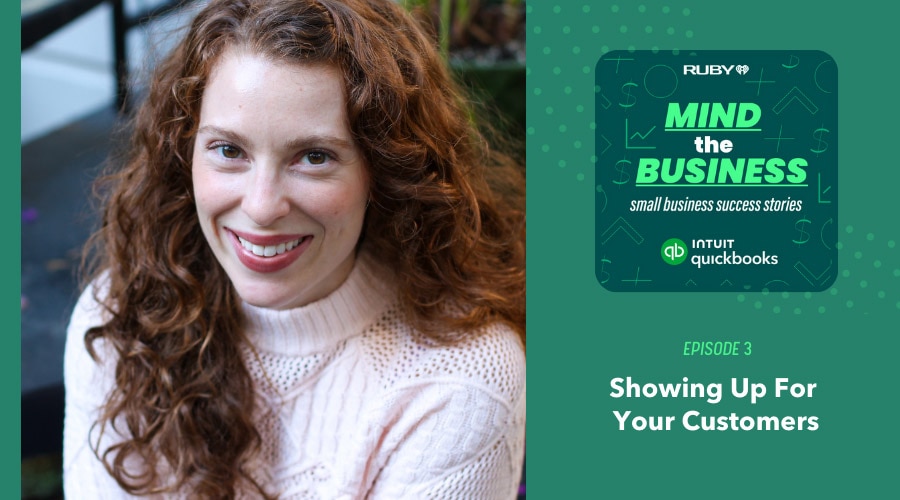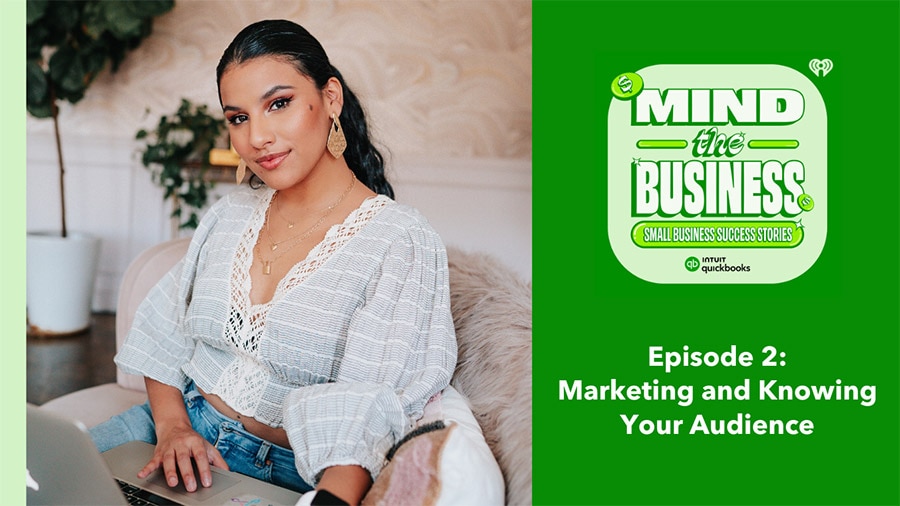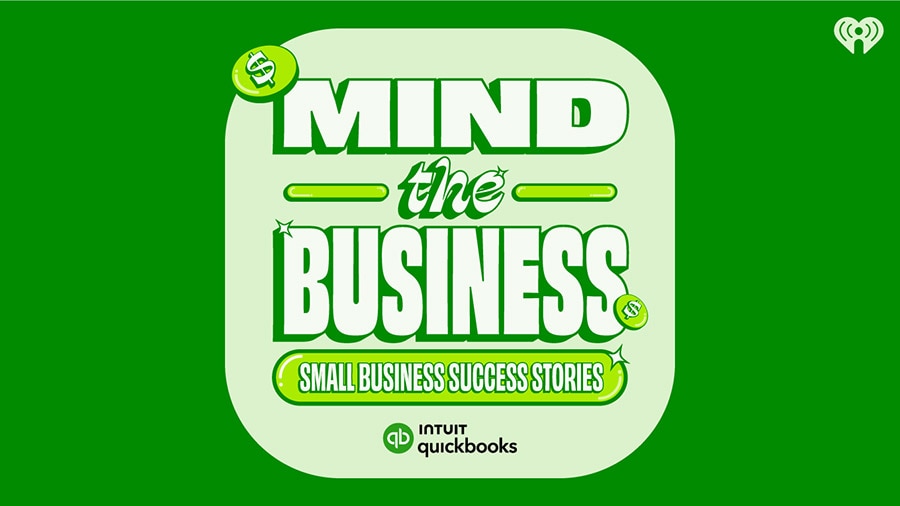Owning a small business can be one of the most rewarding and challenging things a person does. Amid an uncertain economy and ever-evolving consumer trends, there is a lot to figure out and navigate to ensure your business thrives. Join hosts Jannese Torres (Yo Quiero Dinero) and Austin Hankwitz (Rate of Return) as they connect with small business owners and hear their stories about managing the ups and downs of starting and growing a small business. Listen and learn valuable lessons from their experiences that will guide you along the way through your own small business journey.

Customer Success is the Real Success
Sydney Holmes is the definition of a hustler. After majoring in journalism, she landed a job working in public relations at a high end real estate firm. This ignited her career in PR and put her on the path to become a trusted voice in media relations and brand building across multiple industries, including real estate, fashion, and technology. In addition, she often spent her nights performing stand up comedy, so it only made sense to combine her emotional intelligence and humor with her professional experience and branch out into her own business. She's the founder of No Ifs PR and continues to hone her comedy career and work as a freelance writer for multiple publications.
Austin Hankwitz: Welcome to the show, Sydney.
Sydney Holmes: Wow, what a nice intro. Thank you so much for having me. I'm very excited to be here.
Jannese Torres: We're so excited to have you here. First off, let's start off with the name of your business. So “Know Ifs PR” is super fun. It exudes confidence. How did you come up with that?
Sydney: When I was thinking about going freelance in general, I was like, what are the things that are missing from the PR that I've done with brands in-house? Obviously, your brand should be super clear and concise. No ifs, ands, or buts about it. And “no ifs, ands, or buts” is a little too long, so we just went with “No Ifs.” Unfortunately, I mean, the URL looks like “noifs” instead of no ifs, so it's a little silly. It was kind of a snap decision that just sort of made sense in the moment.
JT: That's so funny. I didn't even think about what the implications would be of that in social media and URLs and all that. Alright, so you studied journalism and you got your start in PR, which are two fields that have some overlap, right? So was working in PR on your radar from the beginning or was it something that you landed on and then found that you were enjoying it or even you were good at it?
Sydney: Yeah. So I majored in journalism at Texas Tech University. What got me to New York in the first place was an internship at CBS radio. I was writing music news for CBS for three months. And I just wanted to stay in New York. And so I was like, I need to get in the door somewhere. And I interviewed at this real estate company and they were like, we want you for marketing and ad buying. And I was like, I don't know how to do that, but I guess I'm going to figure it out. And then they called me back like 20 minutes later and they were like, just kidding. We want you for PR. And I was like, “Oh! That's easy. I know how to do that.” PR and journalism work. Very hand in hand, and the best PR I think speaks to journalists and sort of back and forth.
So for me, when I started doing PR, I had no idea what I was doing, but I was like, I'm actually very good at PR and relationship building, which is a lot of what PR is. So those are things that have really come naturally to me throughout my entire life.
AH: Totally. So maybe for those people listening right now, can you educate us as to what the difference is between PR and marketing?
Sydney: Totally. I will say they are very similar and they often speak to each other when they're done really well. So there's kind of two buckets of media. There's earned media and owned media. Owned media is something you pay for, like an ad or like your social media, right? You know exactly what it's going to say. You know exactly when it's going to run. You know exactly the visuals that are going to be used because you paid for that media placement or that ad. Where I work is in earned media. So what that means is I work directly with reporters. So, say you're a client and you have a story that you want to get out. I pitch the idea of that story to the most relevant reporter. They accept the story and then they interview you for that story. The trade off is you don't pay the reporter anything. You don't pay the publication anything, but you don't have any editorial control either. So my job is to act sort of as a liaison between you as my client and the reporter to make sure that the things that you say are relevant to the brand, convey you in the most positive light, and are really clear and concise and move sort of your brand forward.
AH: That makes a ton of sense. Thanks for walking us through that.
JT: How long were you working in PR before you realized you could actually start your own company?
Sydney: I was working in-house and also at PR agencies for about six or seven years before I made the leap.
JT: Okay. Now, let's talk a little bit about this comedy career too, because not only do you have this overlap of PR and journalism, but now you also are throwing in a stand up comedy career. How do you balance all of this? And did you find any surprising overlaps between performing for an audience and performing as someone working in PR?
Sydney: Totally. I mean, we're all kind of performing all day long, but I think with comedy...when I moved to New York, I had stars in my eyes, right? Like, why do you move to New York other than to chase a dream? And so I was doing stand up for a long time, and I just felt like I was never giving my like, original dream a fair shake. It's really hard to do the nine-to-five thing and then go do open mics at night. And so when, not to bring the mood down, but my dad passed in 2019 and I was like, who cares? Nothing matters. Let's go freelance. And that's kind of the motivator. I was like, let's just give myself a real shot.
And so if I wouldn't have gone freelance, I wouldn't have been able to pursue half of the creative stuff that I've done over the last four years. I mean, it's been really incredible. It's been like an amazing journey. I have this one-woman show that I've put on and produced and funded myself and it's got a residency in Manhattan and things are kind of happening.
To answer your question about performing on stage versus performing for people in a boardroom or something like that…I think the thing that I have found has been the most helpful is when you go on stage and you're performing stand up, that's all you. Like if you get a laugh, that's all yours. If you bomb, also all you. So there's a really nice through line where if I go into a pitch, that's all on me. If they didn't like it, that's also entirely all me. So there's a lot of autonomy in both. And you're kind of exposing yourself to people really not liking your vibe and continuing to do it anyway. I think the freedom that comes with comedy is something that I've always wanted to translate into my regular life. That kind of reckless abandon. And I think entrepreneurship is just another extension of that for me.
JT: That's a brilliant take. And I think, you know, when you talk about the fact that you do own all the results, both positive and negative, I mean, that is entrepreneurship, right? That's one of the reasons why you have to develop a little bit of a thick skin, which I imagine you've got to do the same thing when you're a comedian.
Sydney: Totally. It's the exact same thing.
Austin: I think a lot of people glamorize the entrepreneurship journey. They're like, “Oh, it's going to be so easy. I'll get clients. I'll make all this money. It's going to be so fun.” But what they forget about is that it's actually a strategy. There's key performance indicators. There's very specific things that go into success. So do you have a specific strategy for defining what client success looks like specifically across different types of industries?
Sydney: Yeah, so I think oftentimes clients can get wrapped up in the amount of times that they're mentioned in the media, right? And I often try and tell my clients, PR is not going to be — at least in my opinion, and this may be a controversial opinion — but PR is often not a revenue-bringer. It's a brand-builder. So when we're looking at PR hits, for example, of course, if we're not in the media, I'm not doing my job.
However, I have a rubric that I use for all of my clients that analyzes how effective a press placement can be. Anybody can get press placements, but the idea is it takes into account share of voice, which is huge. Are we just randomly mentioned or are we featured? Are we in the headline or are we just part of a wrap up? Is there a link back to our site? What medium was this? Is this print? Is it digital? Is it TV? Is it podcasts? And then the last one that we track is tone. So is it a negative article? Is it a positive article? Is it inclusive of other folks that we want to be associated with? Or, you know, are we mentioned in something that’s maybe not so favorable? So those are some things that we track that not only show, yes, we're in the media, but how a media placement can be effective and beneficial for our clients.
Austin: That makes a ton of sense, and I'm sure a lot of time and energy and focus went into building that rubric, and I'm sure your clients appreciate you walking them through that.
Now, let's talk about the clients who, maybe they've been with you for a little bit, they've turned the corner here, and they're really trending in the right direction. How do you maintain those relationships where they want to continue using you as their PR expert of choice?
Sydney: I have found that people really enjoy working with somebody who is genuine. I think that that's true across the board. So I've always known that I'm funny and I have never tried to hide the fact that I'm kind of a silly goose in my meetings. All of my clients are pretty well aware of the kind of personality that I have and it's always created relationships that I also want to continue.
I think with going freelance and owning your own business, the thing that is super impactful is that you can kind of choose who you want to work with. And if I've created this relationship with a client where I am totally stoic, and there is nothing going on behind the eyes, and I'm just like giving you your KPIs…that's not really who I am. And so one thing that I found really helpful was just being super genuine, being open, and being kind of vulnerable. Sometimes, look… I'm not going to lie to a client and say everything's going great when the results don't have anything to show for it. I will explain to you exactly what's going on and why maybe something isn't necessarily going super well. And the path forward, right? I think being upfront with clients and bringing more of yourself than just this professional, buttoned-up version of yourself is something that has been my saving grace over the last four years of my business.
JT: Okay, so you mentioned the fact that as a solopreneur, you're super happy with being this one woman show. But I imagine that as your clients succeed, that gets you a little more attention and that leads to more clients. So how do you juggle having multiple clients?
Sydney: I have to keep myself super honest with my time. I use a time tracker to keep myself honest because I am the kind of person that will go down the rabbit hole for six and a half hours for one of my smallest clients.
In terms of balancing all my clients, I think the thing that has been really helpful is that I have a weekly call with every single client. And that's always helpful in terms of visualizing my workload. So most of it has to do with kind of balancing my time and, candidly, it's something that I struggle with very often. I'm not the kind of person that likes to schedule my day.
JT: Oh, you're not getting up at 4 a. m. and running 15 miles because that's what everybody on social media says we're supposed to be doing to be successful entrepreneurs.
AH: And then cold plunge and daily journaling and a green juice.
Sydney: If I did that, none of you would ever see me again.
JT: It means she's officially lost it. She's gone off the rails.
Sydney: completely. I so vehemently reject struggle culture and hustle culture. Like, there is definitely a struggle and a hustle to being an entrepreneur. But I just feel like this narrative around entrepreneurialism that it's the hardest thing you'll ever do. And yeah, for some people it is. But for some people, it's just an alternative way to work that better suits your life and your priorities and the things that you care about. I think that impedes a lot of people from joining the fold and a lot of people who would be really good at it.
JT: Now, as a solopreneur, we know there's a ton of moving parts in our business, whether that is tracking your client's needs, deadlines, making sure you're getting paid for the work that you do and invoicing. So can you give us some insight into maybe some systems or processes that you use to maintain and keep track of everything that's going on when it comes to, you know, managing multiple clients?
Sydney: Yeah, the invoicing thing is really interesting, right? Because I have a hard time being like, “Hey, this invoice is late. Where is this?” So every week I have a calendar reminder to go into my invoicing platform and make sure that all of my invoices are on time. I also put a little clause in my contract that says for every week that an invoice is late, X percentage will be added to the invoice. And let me tell you, that has been very effective in getting my invoices on time.
JT: I think that's one of the reasons why QuickBooks decided to create QuickBooks Money because tracking invoices is the bane of most entrepreneurs' existence, right? So that makes it easier for you to get paid and not have to worry about the whole point of why you're doing this, which is getting money in your account.
AH: I'll also add — what I think is really powerful about QuickBooks Money is the different ways you can collect payment, right? I've worked with clients sometimes where they're like, oh yeah, we only accept wires. It's like, I don't want to pay a wire, right? QuickBooks Money, you can collect payment any way you want. I love that part of the product.
So. Let's talk about marketing your business, finding new clients. Do you use success stories as a way to market your business? Can you detail how maybe successful clients might equal success for you as a PR expert in a budding business?
Sydney: Totally. Yeah, I'm bragging online all the time. Which is really foreign to me, both with comedy and also this. I felt like I couldn't call myself a comedian until it was the only way that I made money, right? It's kind of similar to the hustle culture thing, where I felt like I had to clear this bar in order to be considered like a real creative, and one day I was like…there's somebody out there who hasn't written in years calling themselves a writer. So I'm out here.
With clients, it’s sort of the same thing. I used to never use LinkedIn. And then once I started my business and I started posting successful stories…I think repetition is really key. If I'm in somebody's feed all the time, they'll think of me when they're looking for a PR person. And then also I'm part of a PR slack group. I worked with a guy like years and years and years ago whose wife launched a company and he wanted to reach out to me to do PR for him. Like the primary way that I reach people most of the time is through word-of-mouth and then the second would be LinkedIn. But yeah, if you're not bragging online, what are you doing? You need to be. And it's so foreign to me. It feels really gross to do sometimes but it doesn't feel gross in my bank account.
JT: You know what? That's the patriarchy talking, by the way. Let's just put that out there.
Sydney: That's what I'm saying! It's like, “oh, I don't want to brag about my accomplishments!” And it's like…why?
AH: You know, let's double-click on that. Because to brag about an accomplishment, it must also mean that that client was facing a challenge. Right? So maybe can you walk us through a time when a client was facing a setback or a challenge that you helped them navigate and overcome to a success?
Sydney: Yeah, I have this one client that I loved that I still work with on a project basis. They're called Netty. They're a pickleball company based in Cincinnati. And so the guy that I mentioned whose wife started the company, it was Netty. And my goal was just to like, get them in every consumer-y — like Refinery29, Bustle, Cosmo, whatever — like all of those women's interest publications and also television.
And the first few months went like absolute gangbusters. We were in everything. We were on the Drew Barrymore show…we were everywhere. And now Netty is available at Dick's Sporting Goods. They're available at Saks Fifth Avenue. And I like to think that I had a little bit of something to do with that because anytime anyone talked to the CEO of Netty, they would always be like, “Your PR is amazing. You guys are literally everywhere.” And that's one of my prouder ones because I really love the CEO. I love working with her. And she was a solopreneur too.
AH: What's your favorite creative focus?
Sydney: I love creating relationships with reporters. That's probably my favorite. I love going out to coffee and meeting and actually understanding what these people are covering. I started contributing to a couple different publications at the beginning of last year, and I started getting pitches, and they were so random and weird and irrelevant…and it's not even my full time job. I don't get a ton of pitches, and those pitches annoy the hell out of me. And I never want to be that kind of PR person that's just like, pitching you irrelevant nonsense. So I really enjoy meeting up and understanding what actually interests them because these niches that are being carved out now are so crazy and so specific that I want to make sure that if I'm pitching you that it's something that you're not going to be annoyed by and that I don't get my email blocked.
I always got “most talkative" in every class that I had. I always thought, oh, if I could just make that into my job then I would be absolutely set. And I kind of have done that. So I'm thrilled.
This podcast is a production of iHeartRadio and Intuit QuickBooks. Our executive producer is Molly Sosha, our supervising producer is Nakia Swinton, and our writer is Eric Leeja. Our head of post production is James Foster. QuickBooks Money is a stand alone Intuit offering. Banking services provided by Green Dot Bank, member FDIC. Only funds in envelopes earn annual percentage yield. APY can change at any time. Money Movement Services provided by Intuit Payments, Inc., licensed as a money transmitter by the New York State Department of Financial Services.











